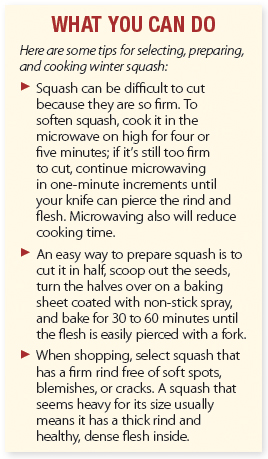Harvest the Bounty of Nutrients in Winter Squash
Need to add some variety to your menus this fall?
“Add winter squash to your healthy meal plans; it’s rich in a number of nutrients, including vitamins, minerals, and antioxidants,” says Rachel Stahl, MS, RD, CDN, CDE, a senior dietitian at NewYork-Presbyterian Hospital/Weill Cornell Medical Center.
Vitamins, Fiber, and Carbs
In general, winter squash is an excellent source of vitamins A and C. For example, one cup of baked butternut squash contains about 450 percent of the recommended daily value of vitamin A and about 50 percent of the recommended daily amount of vitamin C. A cup of acorn squash has a little less of those vitamins but is packed with about a third of the recommended daily value of dietary fiber (21 grams for women and 30 grams for men over age 50).
“Fiber aids in the prevention of heart disease by helping lower your ‘bad’ LDL cholesterol. In addition, a diet high in fiber can help with weight loss, since high-fiber foods tend to keep you feeling full longer,” says Stahl.
Fiber is also important for digestive health. It keeps the contents of your intestines moving along and can help prevent constipation. Diets that are higher in fiber have also been linked to a lower risk of colorectal cancer.
And winter squash falls into the category of starchy vegetables. This means it is higher in starch, a form of complex carbohydrates, than non-starchy vegetables like broccoli, peppers, and lettuce. The good news is that winter squash provides “good” carbs—the type that are broken down more slowly than the simple carbs found in sugary beverages and processed foods that contain refined white flour—that release glucose into the bloodstream at a slower pace, providing your body with a steady source of energy and preventing steep spikes in your blood sugar level.

Antioxidants and Minerals
Winter squash is a good source of phytochemicals called carotenoids, antioxidants that help prevent or delay damage to healthy cells in the body.
“Carotenoids are the orange, red, and yellow pigments that give color to winter squash and other foods, such as tomatoes and carrots,” says Stahl. These plant compounds have also been linked with better eye health, and they may help prevent certain cancers, as well as cardiovascular disease.
You’ll also find several minerals in winter squash. One is potassium, which helps your body break down and use carbohydrates and build muscle. It also plays a major role in blood pressure.
Manganese aids in fat and carbohydrate metabolism, calcium absorption, and blood sugar regulation. And magnesium is involved in energy production, protein synthesis, muscle and nerve function, blood glucose control, and bone formation.
Put Winter Squash on Your Plate
Winter squash is very versatile: Most varieties can be baked, roasted, sautéed, grilled, steamed, or even microwaved.
Stuffed acorn squash is a fall favorite. For the stuffing, use whole-wheat bread crumbs, barley, quinoa, or brown rice mixed with vegetables (onion, celery, carrots), nuts or seeds, and herbs. Buttercup squash can be used to make a vegetarian Indian curry. Pumpkin can be a main ingredient in chili, soup, pancakes, and muffins. And spaghetti squash is a great lower-carb, low-calorie (10 grams carbs, 42 calories in one cup) substitute for traditional spaghetti noodles (43 grams carbs, 220 calories in one cup).
“I encourage my patients to think of adding squash not only to lunch or dinner, but also to breakfast,” says Stahl. Make a fall-flavored smoothie to start your day by blending cooked squash with plain Greek yogurt, a banana, and cinnamon or allspice. Or take a shortcut by substituting canned pumpkin (not pumpkin pie filling) for the squash.
The post Harvest the Bounty of Nutrients in Winter Squash appeared first on University Health News.
Read Original Article: Harvest the Bounty of Nutrients in Winter Squash »


